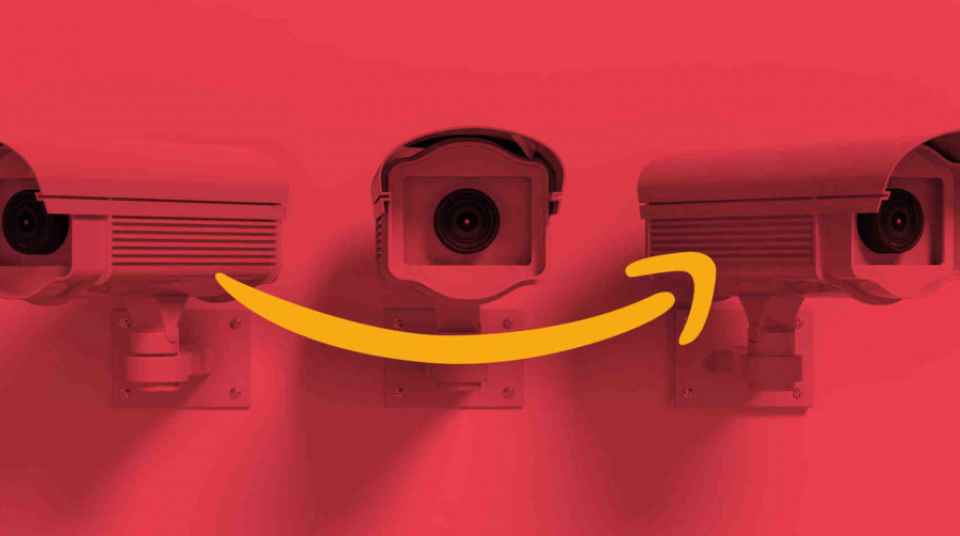Filed under: Analysis, Featured, Repression, Technology, The State, US

Report from insurrectionary anarchist publication Anathema on the growth of networks of surveillance being developed by Amazon and local police departments.
In November, The Intercept reported that internal documents at Ring, the home security company owned by Amazon, reveal that the company is planning to create automated neighborhood “watch lists” by incorporating facial recognition technology into its increasingly vast network of “smart home” doorbell cameras. The feature would alert camera-owners via smartphone when someone deemed “suspicious” pops up on their cameras. Like the old-fashioned “neighborhood watch” that Ring wants to replace, the feature would extend the power of the police and as well as make certain areas of town more dangerous for anyone Ring camera owners deem “suspicious.”
SCOOP: Gizmodo acquired 500 days of data from Ring's app and found the hidden coordinates of its cameras. We were able to map out up to 20,000 Ring devices.
We concluded the data could enable anyone to pinpoint the precise locations of these devices.https://t.co/xOE447WBy2
— dell cameron (@dellcam) December 9, 2019
Ring’s documents do not define what “suspicious” means. In practice, this will likely be defined by gentrifiers and cops, whose systemic racism is well documented. At its core, the watch list would identify people who “don’t belong” in certain areas; this means black and brown people, poor people, and anyone whose appearance deviates from social norms. Ring’s Neighbors program — an online discussion forum between camera owners — is already well known for its aggressive racism and for generally heightening distrust and paranoia within neighborhoods. For many people, Ring’s new feature would make it dangerous to be in certain neighborhoods at all — a victory for the forces of gentrification everywhere.
Ring doorbell cameras have already allowed police to significantly expand their operations, simply by appropriating private citizens’ technology for no additional expense. The technology therefore has immense “value,” not only for the company, but for the state. For decades it’s been steadily expanding policing in order to keep its increasingly immiserated people under control, while struggling to balance its own budgets.
Ring, a surveillance doorbell owned by Amazon, is spinning up its own "news" vertical to incite customers' fears about crime, in case you needed another connection between surveillance capitalism, racism, and the police state https://t.co/9yJ4V4NowX
— Alison Macrina (@flexlibris) May 8, 2019
More than 600 police forces across the country have now partnered with Ring, including six departments near Philadelphia (the PPD is not officially partnered with Ring but has been using its footage to target suspects). The watch lists of “suspicious people” would presumably be shared with the police. The Washington Post has reported that Ring “aggressively pushed to secure new police allies,” flying company representatives to law enforcement agencies to sell them on the surveillance technology. Vice recently reported that Ring hosted private parties for police at the 2018 and 2019 International Association of Chiefs of Police (IACP) conferences.
Local AI-driven watch lists would be yet another step in expanding the reach of Amazon, which appears to be quietly building a surveillance state in collaboration with the federal government. Amazon has been the CIA’s cloud computing supplier since 2013. In selling web services to Palantir, the data analytics company partnered with ICE, it has been called the “invisible backbone” of ICE’s operations. Amazon already has a separate facial-recognition software called Rekognition that is now used by police nationwide. Despite several exposes of the program’s failures and racial biases, Amazon announced improvements this past August that include Rekognition’s ability to identify, in the faces it scans, the emotion of “fear.”
Home security system @Ring started out as a solution to security for homes, but it’s turned into a private surveillance network that police can use to retrieve users’ footage without a warranthttps://t.co/gXDQ5Ec7kc
— GlobalCyberWatch (@CyberWatch_) December 10, 2019
The wide network of surveillance that Ring has already established makes it harder for anarchists and anyone else attempting to attack the socioeconomic order to do so. Ring and other “smart home” technologies should thus be resisted in any way we can think of.
For those of us who want an end to policing and all authority, and those who want to push back against ever increasing gentrification and techno-progress, Ring’s cameras offer a relatively easy target. In the spring of 2017, this newspaper reported that Philly anarchists played a game of Camover in which over 40 security cameras were disabled. Other communiques over the past year have reported specifically targeting Ring cameras as part of an underground campaign against Amazon.





